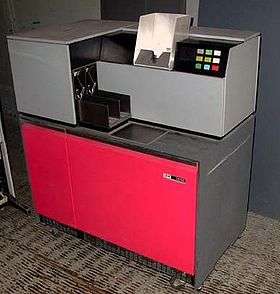IBM 1442
IBM 1442[1][2] was a combination IBM card reader and card punch. It read and punched 80-column IBM-format punched cards[3] and was used on the IBM 1440, the IBM 1130, the IBM 1800[4] and System/360[5] and was an option on the IBM System/3.[6]

(also available in blue)
Overview
The 1442[7] could read up to 400 cards per minute. Cards were read and punched one column at a time and binary cards were permitted. Cards were read using photocells,[8] illuminated by fiber optics, unlike the IBM 1402, which still used wire brushes to read cards. It was even possible to create (but not read, except in Binary Mode[9][10]) "IBM Doilies," cards with every possible hole punched. Few other pieces of IBM equipment could do this without sustaining damage.
There were two output stackers, located in the photo on the left lower side. One could program to select the output stacker for each card read, so it was possible to read cards and separate them into two groups. Cards were placed in the top hopper ("face down, nine-edge leading") and a plate was added on the top of the cards. They were read thru and came out to one of the left lower stackers.
The 1442 did not print on the top of the cards; it just punched what characters the columns contained. An older unit record machine, the IBM 557 interpreter, could be used off-line for this function.
Models
Not all models had both read and punch features.[11]
Reader/Punch models
- The 1442 Model 1 read cards at 80 cards per minute (cpm) and punched at 50 to 270 cpm, depending on the number of columns punched. One stacker was standard and a second was optional.
- The 1442 Model 2 read cards at 400 cpm and punched from 91 to 360 cpm. Two stackers were standard.
- The 1442 Model 6 attached to an IBM System/3 or IBM 1130, read 300 cpm[12] and punched 80 columns per second.[13]
- The 1442 Model 7 attached to an IBM System/3 or IBM 1130, read 400 cpm and punched 180 columns per second.
Reader models
The following units were not designed to punch cards:
- The 1442 Model 3 attached to an IBM 1410 or IBM 7010 computer system. It read cards at 400 cpm. The punch speed was not specified. One stacker was standard on the Model 3.
- The 1442 Model 4 attached to an IBM 1440 computer system. It read cards at 400 cpm, and, like the Model 3, had no punch feature.
2501/1442 combination
The 1442 has two weaknesses for those wanting more throughput:
- Maximum input speed is 400 cards per minute
- The 1442 needs attention for every column of data.
By combining the higher speed IBM 2501 card reader and a punch-only IBM 1442,[5][15] the 1442's limitations are overcome:
- faster input
- the 2501 is buffered/doesn't need attention per column.
References
- In a European museum "Genstand:11000594 IBM 1442 Card read/punch". DataMuseum.dk.
- In an American museum: "IBM 1130 system restoration during 2011". TNMOC (The National Museum Of Comput..).
- "IBM Computers: The Photos You Need to See".
Remember when computers ran on punch cards?
- "Corestore collection: IBM 1800". The CoreStore.
The load device that came with the system is the IBM 1442 card reader/punch
- "Trinity College Dublin installed an IBM 360/44 in 1968/69".
... drives 7.25MB capacity each 2 IBM 2415 magtape drives 9-track 800/1600-BPI, 1 IBM 2501 card reader, 1 IBM 1442 card punch, 1 IBM 2921 printer controller ...
- "IBM System 3". Museum van de 20e eeuw Computers.
... cards were the IBM 2560 Multifunction Card Machine (MFCM) which could read, punch, interpret and sort, and the IBM 1442 which could only read and punch.
- "SECTION I DEPARTMENT OF HEALTH, EDUCATION, AND WELFARE".
IBM 1442 @ 212/mo. IBM 029 @ 62/mo. IBM 7720 @ 125/mo. maintenance @ lTl/mo.
- "IBM 1442 - 1442 combination IBM card reader". SMJohn.com.
IBM 1442 was a combination IBM card reader, card punch. Cards were read punched one column at a time, were read using photocells
- Systems Reference Library IBM 1130 Functional Characteristics (PDF). Page 136 of the Functional Characteristics, Figure 40, shows how each of the 12 holes on a punched card fill the 16 bits of a memory word, when doing an IPL (Initial Program Load), using "Load Mode Read."
- or in Assembler language, using LIBF CARD0 or CARD1
- IBM 1442 Card Read-Punch Models 1 and 2 IBM 1442 Card Reader Models 3 and 4 (PDF). IBM. Archived from the original (PDF) on 2015-04-22. Retrieved 2013-01-25.
- "IBM 1130". EdThelen.org.
IBM 1442 card reader ... 300 cards per minute.
- IBM Corporation (1972). IBM System/3 Model 10 Configurator (PDF).
- IBM Corporation (1972). IBM 2922 Programmable Terminal RPQ 810563, 810564, 810565 Component Description (PDF).
- 1442 ... and/or (emphasis added) IBM 2501 "Punched Card Input/Output Devices".
Eighty-column punched card input and output is provided to the 1130 system by the IBM 1442 Card Read Punch, Model 5, 6, or 7, and/or the IBM 2501 Card